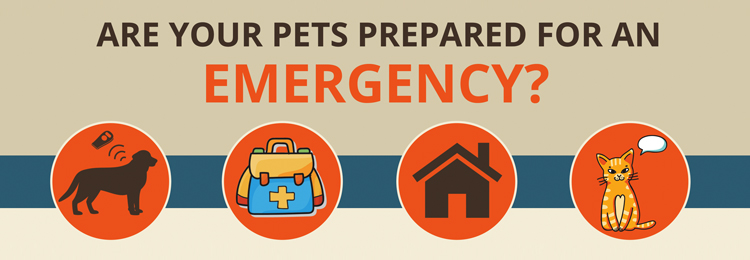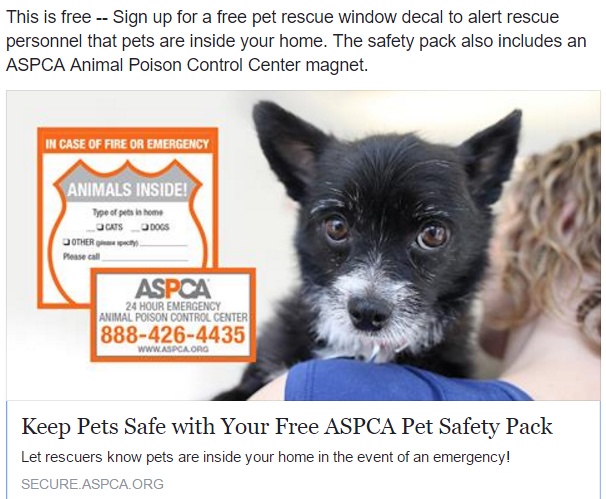
In Florida, hurricanes are the main thing we consider as a threat and reason to be prepared. But other things can also occur, like a house fire or a flood, that would cause you and your pet to be suddenly displaced. Even an unexpected death or illness in the family might require you to pack and leave home in a hurry. Or it could be that you are hospitalized, unable to be at home, leaving someone else to care for your pet. For all of these reasons and many more, you need to have an Emergency Plan for your pet AHEAD OF TIME!!! There are some very easy and practical things that you can do RIGHT NOW to be prepared to care for your pet in case of unpredictable life events.
Identification – to ensure you are re-united with your pet in the case of a separation they need to have a form of identification
- Microchip – a rice grain sized marker that is inserted at the nape of the neck. Each chip has a unique number that can be seen with a special scanner at any veterinary office or pet shelter. The chip is linked in a database with your name, address and phone# and an alternate emergency contact as well. Some companies also allow you to go online and provide a picture of your pet, pertinent medical information and feeding instructions.
- ID tags or collar plates – these are a classic, yet extremely practical and inexpensive way to put your pet’s name as well as your contact information directly on your pet. Some tags even have GPS tracking capabilities.
- Pictures – always keep a current photo of your pet and one of you WITH your pet – printed out in their file and on your phone. This can serve as proof of ownership as well as aid in identification of your pet if need be.

Vaccinations– it is SUPER important to keep your pet’s vaccinations up to date.
- Rabies is required by law for all dogs & cats. DHPP & Bord for dogs and FVRCP for cats are also considered core vaccines.
- Vaccination is especially crucial if you have to travel and need to use pet friendly facilities like dog-walks at rest stops and hotel rooms or other accommodations where other pets have stayed before you. At these places, your pet might get exposed to diseases they normally would be isolated from in your own home environment.
- Be sure to keep a printed copy with your pet’s records, but also take a picture of the vaccine information and store it on your phone for easy access.
- at East Bay Animal Hospital we use PETLY Portals to give you access to ALL of this information online – vaccination information as well as medication that have been prescribed for your pets and copies of bloodwork/lab test results are stored there for each of your pets
- To make an appointment to get your pet’s vaccines update – call East Bay Animal Hospital #727-536-2743

Medications –keep at least a month supply on hand at all times.
- Have written instructions in your pet’s records and in your cell phone. This should include any supplements or other natural products your pet is currently taking…your pet’s PETLY Portal will also contain this information
- Ask your veterinarian for a written prescription to keep on hand in case you need a refill.
Food – a minimum of 7 day supply of both dry and canned diet your pet normally eats.
- This will allow for a slow transition to a new food in the case that you can’t obtain their normal food due to limited supply availability.
- Pets often experience GI upset due to stress….being away from home, traveling, introduction to other animals, etc…..a sudden change of food could seriously exacerbate this problem.
Litter and box – have at least two, gallon sized bags of the litter you currently use.
- Cats can be persnickety if they experience a sudden change of litter type.
- Refusal to use the box can lead to urinary infections, constipation or diarrhea.
- Travel sized litter boxes are easily made from aluminum or metal cake pans. In a bind a cardboard box can be cut down and lined with a garbage bag to create as a make-shift box.
Carriers, leashes, collars – pre-purchase these items as they maybe in short-supply in the case of an emergency.
- Introduce your pet to being in a carrier ahead of time so that they are comfortable with the situation.
- Make sure collars and harnesses are snug but not too tight – attach microchip, ID and Rabies tags to the collar or harness straight away
- be sure your dog is comfortable going potty while on a leash or using pee-pee pads indoors. Free roam to relieve themselves in a yard may not be an option in an evacuation situation.
Know where you will go!!!
- the best choice is to stay with family or friends – be sure to have discussions ahead of time to ensure your pets will also be welcome to come stay as well.
- identify at least two pet-friendly hotels that are in opposite directions of your home in case you need to travel – have them written down and saved in your phone for ease in making reservations.
- as a last resort, some shelters in Pinellas County are pet-friendly, but you often have to be pre-registered…..be sure to check with your local agency ahead of time.
- Most importantly – NEVER LEAVE YOUR PET BEHIND!!!!
Pet Alert window decals –this is a sticker that is placed on a window/door of each exterior room of your home.
- In the case of a fire or other unplanned disaster that leaves your pets trapped inside – it alerts emergency personnel to the number and kind of pets to search for.
- They are FREE to pick-up at East Bay Animal Hospital, the ASAPCA Pet Safety Pack is also free and some firehouses/police stations have them as well.

Important phone #’s – please write these down on your evacuation plan and store them in your phone
- an emergency contact for yourself and your pet
- your veterinarian
- local animal emergency clinic
- ASPCA poison control
- local police
- local animal control
In Summary:
- Get your pet micro-chipped and have a well-fitted collar or harness with ID tags pre-attached for them and keep vaccines current
- Have a physical file at home and a photo file on your phone with the following:
- your pets vaccine information and microchip #
- current photo of your pet and of you with your pet
- name/phone# /address/email of person who can care for your pet in your absence
- feeding and medication instructions that are easy to understand
- name/ph#/address/email of your veterinarian and local emergency veterinary clinic
- ASPCA Poison control, local police and local animal control ph#’s
3. Have a plan of action:
- family member or friend that you and your pet are welcome to stay with
- address/ph#/website of pet friendly hotels in two opposite directions of your home
- pre-register with pet friendly shelters if that is where you plan to go
- pet alert decals on all exterior windows/doors
4. Supplies either already gathered in a specific location or kept in stock and a check-list made for easy gathering
- week of food and month of medications
- carriers, leashes/collars/harness
- beds, blankets, toys
- Litter/box, pee-pee pads
Here is a printable checklist to help you help organized:

